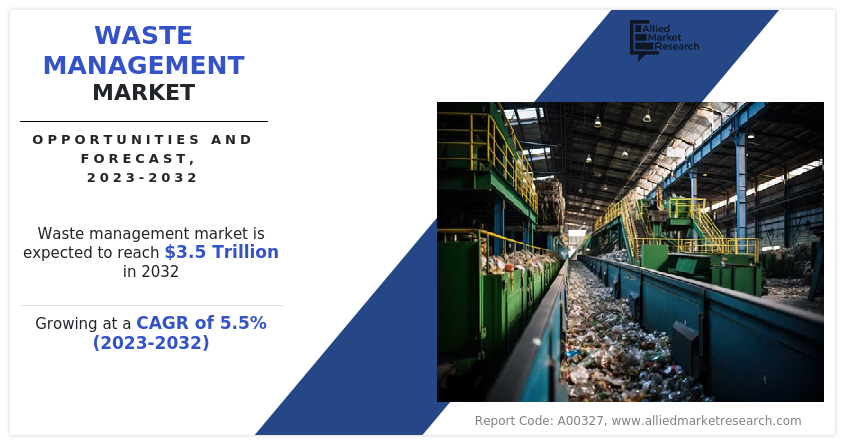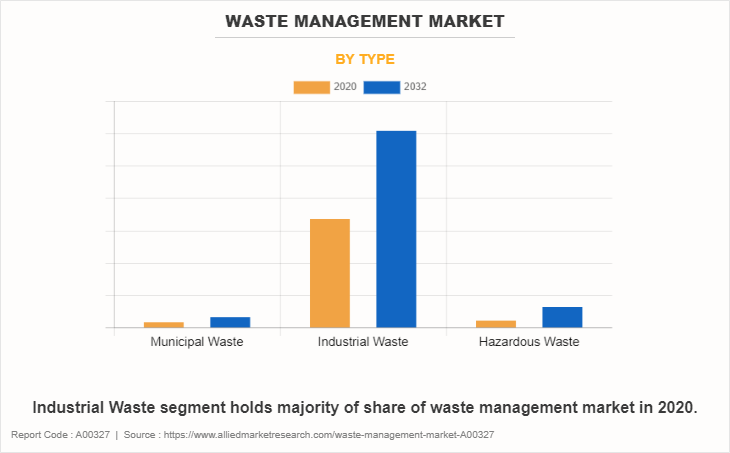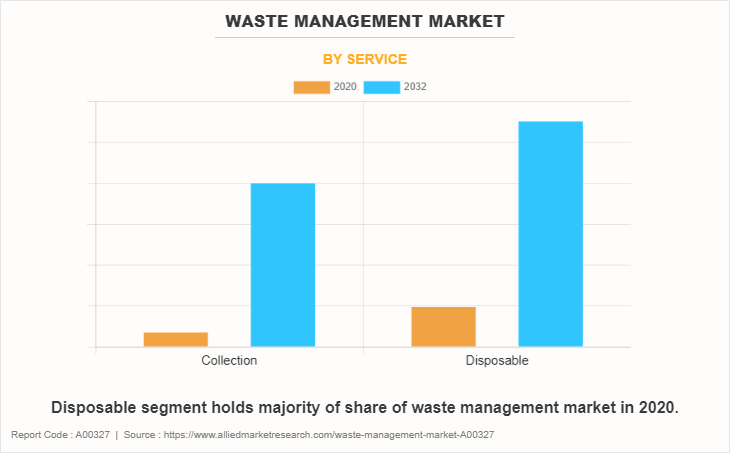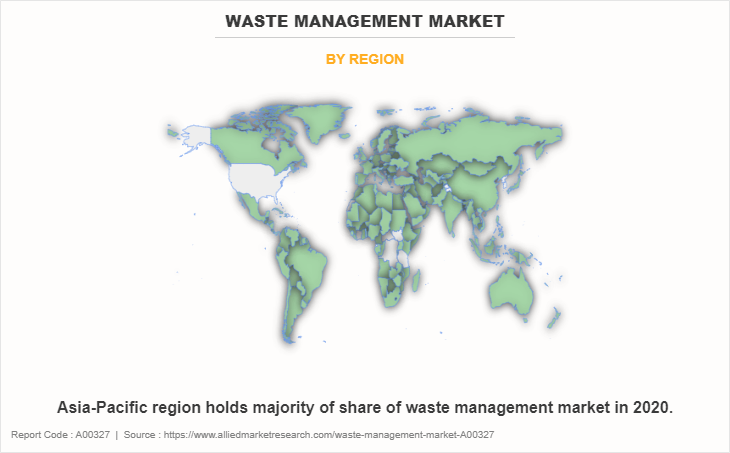Waste Management Market Research, 2032
The Global Waste Management Market Size was valued at $1860.2 billion in 2020, and is projected to reach $3498.2 billion by 2032, growing at a CAGR of 5.5% from 2023 to 2032.

Waste Management Market Dynamics
Waste management is the collection, transportation and disposable of garbage, sewage, and other waste products. It involves treating solid waste and disposing of unwanted products and substances in a safe and efficient manner. Waste management includes all types of waste including solid, liquid, or gas. Waste management deals with municipal, industrial, and hazardous waste. Municipal waste generally refers to residential waste and non-hazardous waste generated in towns and cities. Industrial waste refers to waste generated in industries while production and manufacturing processes. Hazardous waste refers to waste generated in pharmaceuticals, medicals, chemicals, and paint manufacturing industries. Increase in demand for responsible landfilling, where modern landfills are designed to minimize environmental impacts and maximize safety will propel the waste management market specially in developing countries.
Furthermore, major activities performed on waste are its collection and disposal. Collection services refer to collection & transportation, storage & handling, and sorting of waste. Whereas disposable services refer to segregation of waste into landfills, recycling, compositing, and anaerobic digestion.
Growth of the Global Waste Management Market is driven by proactive government measures to reduce illegal dumping. Moreover, an increase in adoption of WTE incineration and recycling techniques is expected to promote the market growth. The Environmental Protection Agency (EPA) introduced the Resource Conservation and Recovery Act (RCRA) with an aim to reduce open dumping and manage hazardous and nonhazardous waste. In addition, the surge in population and increase in globalization has led to an increase in the overall waste volume, worldwide. Urban population produced about 1.3 billion tons of municipal solid waste (MSW) in 2012, which is expected to grow to 2.2 billion tons by 2025. Moreover, increase in industrialization in emerging economies, such as India, China, and Taiwan has led to development of chemical, oil & gas, automobile, and medical industries, which generates enormous amount of waste and causes pollution. Moreover, increase in environmental awareness regarding renewable waste management systems among people and rise in CO2 emissions, globally, are expected to generate growth opportunities for waste management. These factors are expected to significantly contribute toward the growth of the global market.
However, the high cost of procuring and operating waste management solutions is expected to hamper the market growth. In addition, waste management is labor intensive and can consume a lot of amounts as their wages. Similarly, costs of transportation of waste can take up a lot of allocated amounts as the cost includes collection cost and further transportation to landfills or recycling facilities. Cost recovery for waste services differs largely from income levels. Thus, making the market a little rigid, considering the investments related to its process, which, in turn, hampers the waste management market growth.
Due to lockdown, owing to coronavirus, the waste production drastically declined from industries and commercial sector as industries and offices were partially or completely shut down. However, the municipal waste increased from residential areas. Furthermore, due to the decline in manufacturing operations of new goods, led to fall in demand for recyclable material such as rubber and plastic. However, reopening of production facilities and introduction of vaccines for coronavirus disease are anticipated to lead to re-initiation of waste management companies and waste recycle industry at their full-scale capacities.
Conversely, rise in awareness among public and government agencies about these solutions and surge in need to develop waste-to-energy solutions are expected to provide lucrative growth opportunities for market players during the forecast period. Owing to these opportunities several waste management companies have adopted strategies such as business expansion, acquisitions, agreement, and partnership to offer better services in the waste management market. For instance, in March 2019, Veolia announced a partnership with Nestle to develop recycling programs to recycle plastic waste. Similarly, in February 2020, Suez entered an agreement with the Shanghai Chemical Industry Park to recover hazardous waste from the automotive sector and clients inside the industrial park.

Waste Management Market Segmentation
The waste management market is segmented into municipal waste, industrial waste, and hazardous waste. The industrial waste segment is anticipated to dominate the global market, in terms of revenue, during the study period. However, the hazardous waste segment is anticipated to exhibit the highest CAGR during the forecast period.

On the basis of service, the waste management market is segmented into collection and disposing. The disposing segment is anticipated to dominate the global market, in terms of revenue, during the study period and is anticipated to exhibit the highest CAGR during the forecast period.

By Region, The global waste management market is analyzed across North America, Europe, Asia-Pacific, and LAMEA. Asia-Pacific was the largest contributor to the waste management market revenue in 2020 and is expected to maintain its dominance over the forecast period. LAMEA is expected to emerge as a lucrative area with maximum growth potential. This is attributed to rising awareness to recycle waste, which acts as the prime factor for the growth of the market in the region.
The Global Waste Management Market is segmented on the basis of type, service, and region. On the basis of type, the market is divided into municipal waste, industrial waste, and hazardous waste. On the basis of services, it is classified into collection services and disposable services. The collection services segment is sub segmented into collection & transportation, storage & handling, and sorting. The disposable services segment is further segregated into landfills, recycling, compositing & anaerobic digestion, and others. Region wise, the market is analyzed across North America, Europe, Asia-Pacific, and LAMEA.
By Type, In 2020, the industrial segment dominated the waste management market, in terms of revenue and the hazardous segment is expected to witness growth at the highest CAGR during the forecast period. On the basis of service, the disposal segment led the waste management market in 2020, in terms of revenue, and is anticipated to register the highest CAGR during the forecast period. Region wise, Asia-Pacific contributed for the highest waste management market share in 2020, and is anticipated to secure a leading position during the forecast period.
Competition Analysis
The major players profiled in the waste management market include, Biffa Plc, Clean Harbors, Inc., Covanta Holding Corporation, Daiseki Co., Ltd., Hitachi Zosen Corporation, Remondis Se & Co. Kg, Republic Services, Inc., Suez, Veolia Environnment, and Waste Management Inc. These waste management companies have adopted strategies such as business expansion, acquisitions, agreement, and partnership to offer better services in the market.
Key Benefits For Stakeholders
The report provides an extensive analysis of the current and emerging waste management market trends and dynamics.
In-depth waste management market opportunity analysis is conducted by estimations for the key segments between 2020 and 2032.
Waste management market analysis is conducted by following key product positioning and monitoring of top competitors within the market framework.
A comprehensive analysis of four major regions is provided to determine the prevailing opportunities.
The waste management market forecast analysis from 2023 to 2032 is included in the report.
Key market players operating in the market are profiled in this report and their strategies are analyzed thoroughly, which help to understand the competitive outlook of the waste management industry.
Waste Management Market Report Highlights
| Aspects | Details |
| Market Size By 2032 | USD 3498.2 billion |
| Growth Rate | CAGR of 5.5% |
| Forecast period | 2020 - 2032 |
| Report Pages | 176 |
| By Type |
|
| By Service |
|
| By Region |
|
| Key Market Players | Hitachi Zosen Corporation, Republic Services, Inc., SUEZ, Veolia Environnement, Daiseki Co. Ltd, Covanta Holding Corporation, Waste Management Inc., Remondis Se & Co. Kg, Biffa Plc, Clean Harbors, Inc. |
Analyst Review
The utilization of waste management services is expected to increase, owing to rapid industrialization and urbanization. Moreover, significant technological advancements in solid waste management solutions fuel the market growth. Asia-Pacific is projected to be the highest revenue contributor to the global market, whereas LAMEA is expected to offer lucrative opportunities to the key players in this market.
Rise in population, increase in migration rate, lifestyle changes, increase in adoption of technologically advanced waste management solutions such as e-waste management and improvements in government measures for solid waste management in developing regions drive the market growth. However, high investment costs and lack of awareness impede market growth. Moreover, presence of high unmet waste management needs in developing economies such as China, India, and Brazil is expected to create lucrative opportunities for setting up waste management systems during the forecast period.
The global Waste Management Market was valued at $1,860.2 billion in 2020 and is projected to reach $3,498.2 billion by 2032, growing at a CAGR of 5.5% from 2023 to 2032.
The Waste Management Market encompasses the collection, transportation, and disposal of garbage, sewage, and other waste products. It involves treating solid waste and disposing of unwanted products and substances in a safe and efficient manner. This market includes all types of waste, including solid, liquid, or gas, and deals with municipal, industrial, and hazardous waste.
As of 2020, the Asia-Pacific region held the highest market share in the Waste Management Market and is anticipated to maintain a leading position during the forecast period.
To get latest version of global waste management market report can be obtained on demand from the website.
The top companies holding the market share in the global waste management market report include?Biffa Plc, Clean Harbors, Inc., Covanta Holding Corporation, Daiseki Co., Ltd., Hitachi Zosen Corporation, Remondis Se & Co. Kg, Republic Services, Inc., Suez, Veolia Environnment, and Waste Management Inc.
Loading Table Of Content...
Loading Research Methodology...


